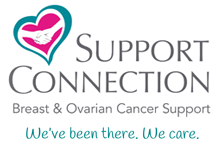By Barbara Cervoni, LMSW, ACSW
Director of Services and Communication
If you have a loved one with breast or ovarian cancer, chances are you want to be helpful and supportive, to somehow make things easier. But, like most people, you may be at a loss figuring out what to say or what to do.
Support Connection’s Peer Counselors have some ideas for you, based on their work with many women who’ve shared the simple things that eased their trip along the long path from diagnosis, through treatment, recovery and beyond.
Stay In Touch
- Check in regularly. Just say hi and ask how she’s doing. It tells her you’re thinking about her and that you care. You don’t always need to “do” something or “say” something to be helpful. Being consistently present is what matters.
- Cards, notes, emails – these are all great ways to let her know she’s in your thoughts. They also become lasting messages of love and reassurance she can re-read whenever she needs a boost.
- Give small gifts that offer comfort and make her smile. Lotion… a pair of fuzzy socks… warm pj’s or a robe… light reading material to take her mind off what she’s going through.
- Say three simple words: “I love you.” The most healing words in the universe.
- Keep the communication going. Don’t stop because treatment ends. That’s when she can finally step off the roller coaster she’s been on, look back at where she’s been, and wonder where she’s headed next. She still needs your support.
Be There
- Be a calm presence, accepting any emotions or fears she needs to express. That can be tough when you have your own fears and emotions.
- Allow her to be human. Most people try their hardest to be strong. It’s good to acknowledge her strength, but no one can be strong all the time. Even Superman has to be Clark Kent sometimes. Give her “permission” to take off her cape.
- When she’s up for it, visit with her. Thirty minutes over a cup of tea… an outing for lunch or a movie… anything that takes her away from cancer for a bit is invaluable.
- Remember to talk about the everyday things going on in your lives. Don’t be afraid to laugh – laughter really is wonderful medicine.
Help Out
- Offer to go with her to appointments. Dealing with cancer and all the decisions and information is overwhelming and exhausting. Offer to: go along to take notes…. sit with her while she waits … stay with her during a test or chemo.
- Don’t wait for her to ask for help, just do it! It’s really hard to ask and she may not have the energy to do so. Here are some ideas:
- Call to say you’re going to bring over a meal. Tell her what you have in mind and ask if there’s something she’d prefer instead.
- Mention you’re going to the grocery store. Ask what’s on her shopping list and offer to pick it up.
- Let her know when you’re available. Ask what she needs help with during that time.
- If she has children, anything you can do to keep life as normal as possible for her children will help her feel better. So, take them for playdates, drive them to activities, etc.
Just Listen
- The musician Alfred Brendel said: “The word ‘listen’ contains the same letters as the word ‘silent’.” It’s normal to want to solve or fix things, to find the right thing to say. Try to silence your mind and just be in the moment with her.
- Avoid saying things like “You’ll be fine” or “It’s all behind you now.” It’s never really over. Instead, ask how she’s feeling. When she tells you, offer compassion and support.
- Stay away from offering advice. She’s already getting instructions from all directions. Even if you’ve been through a similar experience, remember, everyone is different.
- Let her set the boundaries. There may be times when she doesn’t want to talk, or things she feels are too private. You’ll hear this when you listen.
